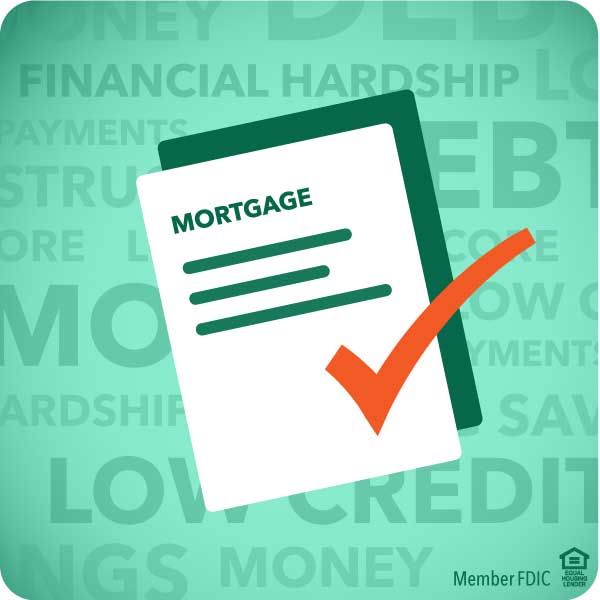FDIC-Insured - Backed by the full faith and credit of the U.S. Government
-
-
-
FNBO
Mortgage
Date Published: July 24, 2019
-

Trouble Getting a Home Loan?
How to get approved for a mortgage despite financial hardship
Unexpected expenses are just that. And, unless you went on the surprise vacation of a lifetime, typically—they are also unwanted. Maybe you bought a car this year because…well, it was time. It could be you paid a high health insurance deductible for a recent surgery. The scenarios are endless but, in any case, the money you tucked away for a down payment on a home is now depleted.
Perhaps you’ve also struggled to pay bills on time in recent years, in between jobs, and now, those late payments dot your credit report with a rating that is less than appealing to lenders. Maybe, you’ve even had to declare bankruptcy.
These are all obstacles when it comes to being approved for a mortgage, but they aren’t insurmountable, if homeownership is your goal.
- A low credit score/rating – If you have a credit score below 620, getting a traditional home loan is certainly more difficult, even unlikely. And, if you are able to secure a traditional loan, you’re likely going to pay a higher interest rate as compared to someone with a higher credit rating.
- Lacking savings for a down payment – Lenders have traditionally sought a 20% down payment on a conventional home loan, but many buyers – especially first-time – often put down far less. Some options, such as getting a mortgage through the Federal Housing Administration (FHA), may allow borrowers to make a down payment as low as 3.5%.
Finding a good solution.
Don’t give up! As we touched on above, borrowers with less-than-attractive credit scores, and who don’t have the funds to make a 20% down payment, still have options.
- FHA Loan – If you have a credit rating below 620, or don’t have substantial funds for a down payment, consider a loan through the FHA. For borrowers who qualify, FHA loans allow them to make a down payment as low as 3.5%. The FHA insures the loans that lenders make, so if a borrower defaults, FHA pays the lender the amount owed. “If you get an FHA loan for your home, keep in mind you will be required to have mortgage insurance, which is an additional expense added to your loan,” said Alan LaFollette Managing Sales Director, FNBO. “When you talk to a mortgage loan expert, they will go through all of the details of an FHA loan, and other home loan options, so you understand the requirements and can make informed decisions.”
- Department of Veterans Affairs (VA) Loan – Eligible veterans, current service members and surviving spouses of service members can apply for a home loan through the VA, which offers loans with no money down for qualified borrowers. In many cases, private mortgage insurance is not required. Again, ask your lender for all the details!
Other options for those with low credit scores.
If you have a low credit rating, there are steps you can take if you are focused on a conventional home loan. Here are a few:
- Boosting your credit score is the best way to improve your chances of getting a conventional home loan. Start by checking your credit report for any errors or incorrect information.
- Keeping your credit card utilization under 30% will also help with your credit score. For example, if you have a $10,000 credit card limit, keeping the amount that you have used under $3,000 will help with your credit score.
- Paying off debt. Debt-to-income ratio is a key factor when lenders determine your ability to pay off a mortgage loan.
- There may be a solution, even If you have records of late payments or a pattern of delinquencies on your credit report—a lender may be able to work with you. “If you can explain why those payments were late, and you have legitimate reasons, then we can often work with you,” says LaFollette. “Just know that having a pattern of late payments on your credit report might result in the lender requiring a higher down payment or a lower debt-to-income ratio. The important thing to remember is that we will work with you to find a home loan that aligns with your goals.”
- Getting a co-signer. This is sometimes another option for borrowers, although it’s not a common alternative. It makes the person who co-signs on your loan responsible for repaying the mortgage if you don’t or can’t. Not a risk that many are willing to take.
A final thought.
“Whether it’s a low credit rating, a lack of funds for a down payment or something else, the place to start is with a mortgage loan officer. They can help you determine the best solution when it comes to applying for a home loan,” added LaFollette. “FNBO will be a partner with you on this journey. Finding solutions is what we do best.”
Got questions? Start the process here or stop by an FNBO branch today!
The articles in this blog are for informational purposes only and not intended to provide specific advice or recommendations. When making decisions about your financial situation, consult a financial professional for advice. Articles are not regularly updated, and information may become outdated.
